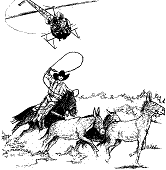Vertebrate Pest Conference: Proceedings

Vertebrate Pest Conference Proceedings: 11th (1984)
Date of this Version
March 1984
Document Type
Article
Abstract
Carnivores obtain plague infection through ingestion of infected rodents or rabbits or via flea bite. Most are resistant to infection, show little or no symptoms, and produce antibodies to Yersinia pestis which may persist for several months. Consequently, carnivores can be used as serological plague sentinels using the specific passive or indirect hemagglutination test in the laboratory. A carnivore serology program for plague detection began in California in 1974. The program is a cooperative effort incorporating state and federal vector-borne disease units and state and federal predator animal control personnel. The program has proven to be an important tool in the overall statewide plague surveillance program of the California Department of Health Services, and has been effective in detecting plague over broad geographical areas of the state, as well as in areas hereto-fore unknown to experience plague activity. Carnivore serology has also proven useful in helping to delineate the extent of plague epizootics, and has given insight into the patterns of enzootic plague among wild rodent populations.

